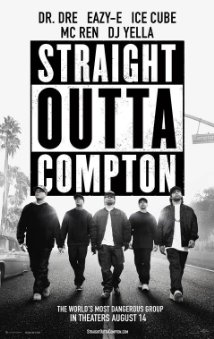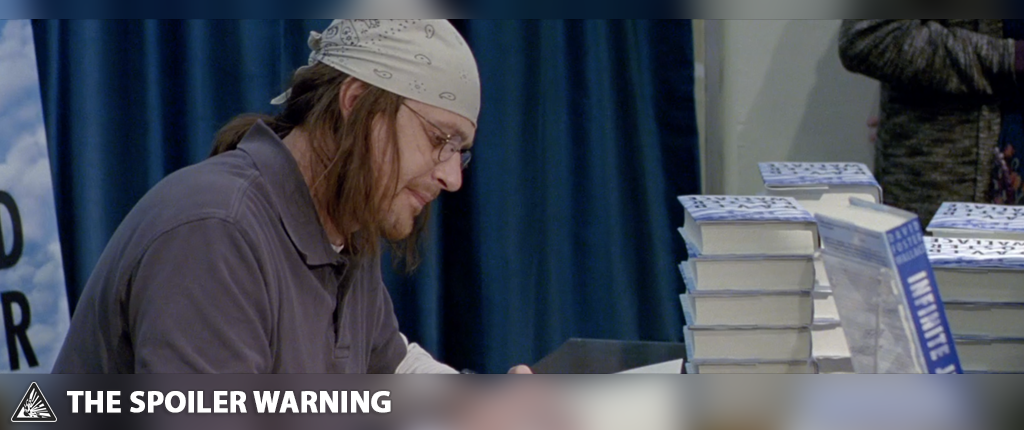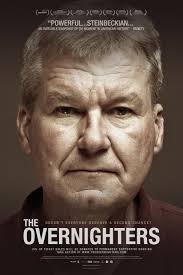
Grateful for what this film was, disappointed in what it shied away from.
Straight Outta Compton is extraordinarily timely in its treatment of brutality, fearmongering, and the importance of passionate expression. For anyone who has posted one of those godawful memes about the “irony” of violent protests in response to recent racial profiling scandals, this should be absolutely mandatory viewing. Not because it makes its protagonists out to be angelic social justice warriors, but because it allows us to be vaguely uncomfortable with their methods while still convincing us to cheer for their cause. To err on the side of the oppressed, and to ask where anger comes from rather than criticize it from our smug vantage points. NWA were a product of their times; a visceral shout from a community that desperately needed a voice. F. Gary Gray puts us there in the thick of it: the gangs, the dope houses and militant raids, the feeling of being entirely abandoned by society.
In my white, middle class upbringing, I’ve never felt abandoned by anyone. No authority figure, police or otherwise, has been anything but kind to me — if a friend of similar class and privilege shouted “fuck the police”, I’d say “well, it’s more nuanced than that” or some similar wet-blanket sentiment. But in 1989 Detroit, amidst a sea of middle fingers, Gray gave me a glimpse of how that chorus might feel to someone living it. And it feels incredibly gratifying. It does what art is supposed to do: it transports.
Unfortunately, West Coast gangsta rap often traded one form of oppression for another, and NWA et al were no exception. While the film trusts us to put violent bravado in its proper context, it seems desperate to minimize the rampant misogyny. Oh, it’s there occasionally — orgiastic pool parties, a “Bye Felicia” origin story, dutifully acknowledging a side of hip hop culture that Gray knows the audience won’t totally side with. But it only gives us obligatory scraps of admission, which almost feels worse than outright denial. Absent is any toll it takes on the women around them, whose three varietals (slutty groupie, saintly mother, strong-willed wife) might as well be different species. I felt a bit of unease watching parade after parade of topless women worshipping our protagonists — not because they shouldn’t have shown it, but because they could have shown so much more alongside it. We see Politically Correct Uproar and we see blanket approval, but we never see the (I assume massive) conflicted middle.
That lack of trust in the audience was most evident in the broad strokes it used to paint its characters. Suge Knight is a bad dude and bad dudes do bad things, period. Eazy is given the most flaws of the group, but only to preface a Prodigal Son redemption. Ice Cube, the obvious pro-First-Amendment warrior, voices all of the aggression and violent rhetoric — he’s earned it, it’s safe with him. But save the too-entertaining-to-be-offensive “No Vaseline”, we rarely get vulgarity (or even basic anger) without clear “socially conscious” overtones. You’d almost think they were Public Enemy.
Dre? He’s a saint in a DJ booth, perennially above it all, urging his friends to cut the gangster shit and think about the art. He’s seen in concert, he’s seen spitballing with Snoop, he’s seen on billboards as a multi-platinum artist, but he’s rarely seen participating in any of those things that made him famous. Dre, whose verses (ghostwritten or not) with NWA (“One Less Bitch”) and collaborations with Snoop (“Bitches Ain’t Shit”, “Ain’t No Fun”) were perhaps the most vile and damning of the lot, who helped shift the focus from the hyperbolically-violent sexism of the era to the women-are-flesh-bots-and-isn’t-that-awesome sexism that still echoes in hip hop today, irony-free. I’m not saying they had to show him assaulting Dee Barnes or getting a lecture from Oprah about respecting women, but to have him just sit there as a sort of pre-Apple-Exec Christ figure? For a movie with plenty of grit, it felt oddly spineless.
Straight Outta Compton, like the album that inspired it, puts a well-needed spotlight on a particular time and place, and for that I am very glad it exists. And like the album, there’s a good deal of baggage that comes with that endorsement — but who knew, 25 years later, the problem would be that it’s too tame?








